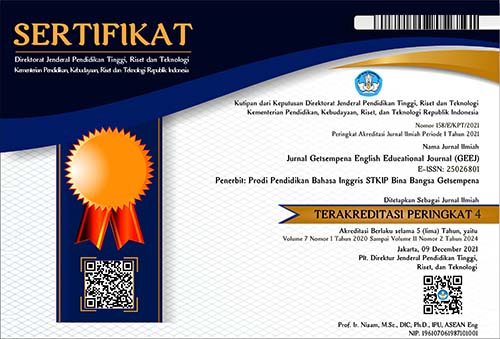WONDERFUL OR AWFUL? STUDENT-TEACHERS’ CLASSROOM MANAGEMENT EXPERIENCES IN PRACTICUM TEACHING
Abstract
This study is aimed at probing the strengths and weaknesses of classroom management experienced by student teachers at Department of English Language Education, UIN Ar-Raniry during the internship program at designated schools. Data collection was based on qualitative semi-structured interview with 8 student teachers chosen by purposive sampling from the 250 fourth student teachers at the English Language Education Department in 2017/2018 academic year. The findings of the current study indicated that group discussion method applied in the classroom enable more efficient classroom management. On the other hand, it is found that student teachers still experienced great deal of anxiety in managing the classroom. This may cause serious problems when facing real classroom management following their graduation as real teachers.
References
Çinar, I. (2010). Classroom Geography: Who Sit Where in the Traditional Classrooms? Journal of International Social Research, 3(10).
Coskun, A. (2013). Stress in English language teaching practicum: the views of all stakeholders. H. U. Journal of Education, 28(3), 97110.
Gan, Z. (2013). Learning to teach English language in the practicum: what challenges do non-native ESL student teachers face? Australian Journal of Teacher Education. Vol 38, 3.
Haigh, M., Pinder, H., McDonald, L. (2006). Practicum's contribution to students' learning to teach. Retrieved on March 6, 2019, from http://www.leeds.ac.uk/bei/Educationline/browse/all_items/160597.html
Hastings, W. (2004). ‘Emotions and the practicum: the cooperating teachers’ perspective’ Teachers and Teaching: theory and practice 10/ 2:135-148.
I'anson, J., S. Rodrigues and G. Wilson. (2003). ‘Mirrors, Reflections and Refractions: The contribution of microteaching to reflective practice’ European Journal of Teacher Education 26/2:189-199.
İnceçay, G., & Dollar, Y. K. (2012). Classroom management, self-efficacy and readiness of Turkish pre-service English teachers. ELT Research Journal, 1(3), 189-198.
Lee, Y., & Lee, J. (2014). Enhancing pre-service teachers' self-efficacy beliefs for technology integration through lesson planning practice. Computers & Education, 73, 121-128.
Macías, D. F., & Sánchez, J. A. (2015). Classroom management: A persistent challenge for pre-service foreign language teachers. Profile Issues in TeachersProfessional Development, 17(2), 81-99.
Nunan, David. (2009). Second language teaching and learning. Cengage Learning Asia PteLtd. Philippine Edition
Oliver, R. M., Wehby, J. H., & Reschly, D. J. (2011). Teacher classroom management practices: Effects on disruptive or aggressive student behavior. Society for Research on Educational Effectiveness.
Rosenshine, B. V. (2015). How time is spent in elementary classrooms. The Journal of Classroom Interaction, 50(1), 41-53.
Starkey, L. and Rawlins, P. (2012) ‘Student teacher learning during practicum experience’, Tean Journal 4 (1) January [Online]. Retrieved in April 2017, from http://bit.ly/I5VJ5s
Stokking, K, F. Leenders, J. De Jong, J. Van Tartwijk. (2003). ‘From student to teacher: reducing practice shock and early dropout in the teaching profession’ European Journal of Teacher Education 26/3:329-350.
Timoštšuk, I., & Ugaste, A. (2010). Student teachers’ professional identity. Teaching and teacher education, 26(8), 1563-1570.
Tuli, F. and File, G. (2009). Practicum experience in teacher education. Ethiopian Journal of Education and Science.5 (1). 107 – 116
Way, S. M. (2011). School discipline and disruptive classroom behavior: The moderating effects of student perceptions. The Sociological Quarterly, 52(3), 346-375.
Yusof, N. et., al. (2014). Student teachers perception towards teaching practicum programme. International Journal for Innovation Education and Research. Vol.2-10, 2014.
Zhu, C. (2012). Student satisfaction, performance, and knowledge construction in online collaborative learning. Journal of Educational Technology & Society, 15(1), 127-136.
























